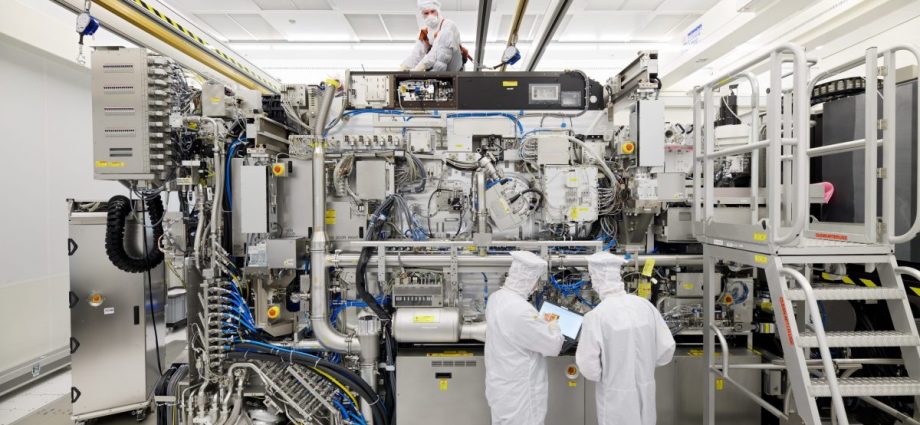
ASML Holding, the world’s largest supplier of chip-making machines, accused a former employee in China of stealing data from a shared drive, leading to a possible violation of certain export control regulations.
The accusation was made in the company’s 2022 annual report released on Wednesday. It comes as the Dutch and Japanese governments are reportedly drafting rules to restrict the exports of their deep ultraviolet (DUV) lithography equipment to China.
The company said the misappropriation was not material to its business. It said it had reported the incident to relevant authorities.
Wang Wenbin, a spokesperson of the Chinese foreign ministry, said Thursday that Beijing was not aware of ASML’s accusation. He said China has always attached great importance to the protection of intellectual property rights.
Meanwhile, the China Semiconductor Industry Association (CSIA), the country’s top chip industry trade group, said in a statement that the United States, the Netherlands and Japan should stop pushing forward the proposed export ban.
The group said the possible export controls would cause serious harm to China’s chip sector, with detriment to the global economy, as well as long-term damage to the interests of consumers worldwide.
It said it would support foreign enterprises that promote the globalization of the sector. It also called on the Chinese government and relevant agencies to establish rules for maintaining the healthy development of the industry’s ecology.
Last month, US President Joe Biden met with Japanese Prime Minister Fumio Kishida and Dutch Prime Minister Mark Rutte at the White House separately, persuading them to impose a chip export ban on China.
Media reports said in late January that the Netherlands and Japan, which have dominated the lithography markets for decades, had agreed to impose chip export bans on China and started drafting their rules.
Since 2020, China has been banned from importing extreme ultraviolet (EUV) lithography, which can make chips smaller than 22nm, from the Netherlands. These high-end chips are now mostly used in the central processing units (CPU) in mobile devices.
If China cannot import immersion DUV lithography, it will not be able to make 28nm chips, which are widely used in consumer electronic products and automobiles.
While it is unclear when the Dutch and Japanese governments will announce their measures, ASML said the leakage of its chip data in China might have resulted in a violation of some export control regulations.
ASML said it had been subject to misappropriation of data relating to proprietary technology by an employee, who has now been sacked, in China. It did not give more details about what kind of data was stolen.
Citing people familiar with the situation, Bloomberg reported on Thursday that a male worker had taken data from Teamcenter, a product life cycle management program supplied by Siemens. It said the program allows for common access to a single repository of all product-related knowledge, data and processes.
Prior to this, ASML filed a lawsuit in California in 2018 against Dongfang Jingyuan Electron Ltd, a Beijing-based firm, for intellectual property theft.
It accused a former ASML employee named Yu Zongchang of stealing two million lines of source code for critical ASML software and sharing part of it with his employees in Dongfang Jingyuan in China and XTAL Inc in the US.
Before Yu founded Dongfang Jingyuan and XTAL in 2014, he had worked as an engineer at ASML until 2012, legal documents showed.
According to its website, XTAL is invested in and was founded by a Hong Kong private investor along with industry veterans in semiconductor design and manufacturing.
XTAL went bankrupt in 2019 due to the lawsuit but Dongfang Jingyuan and Yu were unaffected.
Last November, Dongfang Jingyuan successfully raised 1 billion yuan (US$139 billion) from a group of Chinese investors. In a press release, it praised itself for having made some technological achievements after eight-years of hard work.
ASML said last year that DongFang JingYuan was actively marketing products in China that could potentially infringe on ASML’s IP rights. It said it had reached out to certain customers and urged them not to aid or abet DongFang JingYuan in any such potential infringement.
Commenting on the potential export ban to China, ASML’s President, Chief Executive Officer and Chair Peter Wennink said in the annual report on Wednesday that it would take many months for the Dutch and Japanese governments to write and enact new rules.
“We understand that steps have been taken that would cover advanced lithography tools as well as other types of equipment,” Wennink said. “The terms of this agreement have not been publicly disclosed and remain confidential for now.”
He said the company did not expect these measures to have a material effect on its expectations for 2023.
ASML’s Chief Financial Officer Roger Dassen said the company would continue to engage with the authorities to discuss and assess the potential impact of these measures.
Read: CEO says US chip ban won’t hurt ASML China revenue
Follow Jeff Pao on Twitter at @jeffpao3

